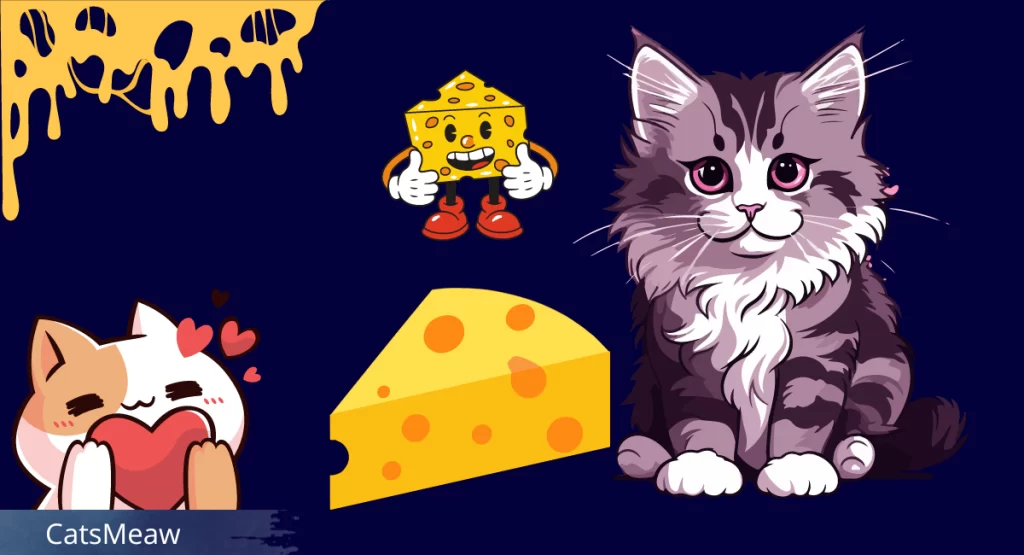Does your cat look at you with hopeful eyes when you’re about to eat a piece of cheese? Can cats eat cheese? You are certainly not the only one! Cats naturally love dairy products. We explain why in this article. We will also give you advice so that your little cat can enjoy eating cheese without risk to its health.

Table of Contents
Can cats eat cheese?
Cats are big lovers of products that contain proteins and fats. They have a very good nose with which they can even smell themselves. Dairy products such as milk, butter and cheese contain many of these substances. These treats are a real magnet for your sweet cat. Cheese, however, remains the absolute favorite, because it also contains a good dose of salt. Although salt, and cheese in general, is not very good for the health of cats, they love it.
Interestingly, cats’ taste buds are not as receptive to sweet taste, which is why they are not as interested in sweet foods. If they opt for your ice cream or chocolate, it’s probably the fat content that attracts them, not the sweet taste. Remember that chocolate is very toxic to cats, so always keep it out of their reach!
Why is cheese bad for cats?
Cheese is first of all a dairy product generally coming from cow’s milk. Very often, we have this image of the cat who likes milk, but this is not necessarily the case. In fact, the latter are generally lactose intolerant. Kittens consume their mother’s milk well, but as adults, most cats will have difficulty digesting cow’s milk, so consuming a dairy product will cause digestive problems in cats.
Related: Healthy Homemade Cat Food Recipes
They will generally manifest as vomiting as well as diarrhea. Additionally, cheese contains a good amount of fat and salt. The cat risks obesity and even kidney and cardiovascular problems.
Are all cheeses bad for cats?
If you still want to give him a little cheese, know that certain varieties are more recommended than others.
Hard and semi-hard cheeses (cheddar, parmesan, emmental, Comté)
Hard cheese is made from the curds pressed and condensed into a solid form, which reduces the water content of the whey. If your cat likes cheese, it is better to give him hard cheeses. They contain a low amount of lactose and are therefore not as difficult for your companion to digest.
Our pick: The Best Cat Food for Indoor Cats
Soft cheeses (brie, maroilles, feta, camembert)
Soft cheeses are made by combining milk proteins with lactic acid bacteria. These cheeses are not good for your cat because they contain a very high concentration of lactose. At the same time, these cheeses are often made with raw milk, which may contain salmonella and listeria, two pathogens that can cause serious illnesses.
Blue-veined cheeses (blue, Saint-Agur, gorgonzola, roquefort)
You should avoid blue-veined cheeses at all costs. These cheeses contain a mold spore called “penicillium,” which is toxic to your four-legged friends. This is why you should not give them cheeses with a bloomy rind. Cheeses like blue also contain a high amount of fat.
Dairy-free or vegan cheeses
Vegan cheeses do not contain lactose, so they must be safe, right? Unfortunately, the answer is no. They contain high salt and fat content, making them unacceptable for cats.
Cheeses made from goat and sheep milk are often more digestible than those made from cow’s milk, but even then they may not be successful for cats.
What about cheese treats for cats?
Some cat treats made specifically for cats contain a little cheese or are cheese flavored, and you can give them to your cat in small amounts as an occasional treat. They can also be useful for hiding your cat’s medications inside, to encourage them to take their pills. However, if your cat is lactose intolerant, these treats may still give them an upset stomach, so keep an eye on your cat and if they are not feeling well, use a different type of cat treat instead. ‘future.
My cat ate cheese, what should I do?
If your cat has eaten cheese without your knowledge, don’t panic! The worst he normally risks is diarrhea or vomiting. Keep an eye on him and if problems persist, consult a veterinarian to prepare for any eventuality. If your cat doesn’t feel well after eating cheese, try to keep it out of reach of their paws in the future and save it as a treat just for you!
Related: Food For Cats With Sensitive Stomachs
Cheese is not a food prohibited for cats. They can therefore consume it, especially since it is a good source of protein. However, its consumption should be monitored so as not to be very harmful to them. It can be used as an occasional treat. It should also be noted that cheese made from goat’s milk is more recommended for cats than that made from cow’s milk. In all cases, consumption must remain moderate.
